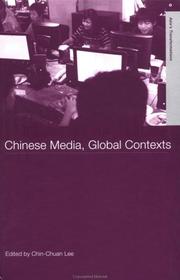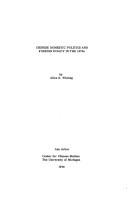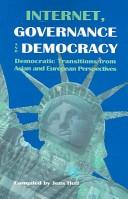| Listing 1 - 10 of 14 | << page >> |
Sort by
|

ISBN: 0742567907 9780742567900 9780742540576 074254057X 9780742540583 0742540588 Year: 2008 Publisher: Lanham Rowman & Littlefield
Abstract | Keywords | Export | Availability | Bookmark
 Loading...
Loading...Choose an application
- Reference Manager
- EndNote
- RefWorks (Direct export to RefWorks)
After a period of self-imposed exclusion, Chinese society is in the process of a massive transformation in the name of economic progress and integration into the world economy, yet the Chinese Communist Party (CCP) is seeking to maintain its rule over China indefinitely. Examining Chinese propaganda and thought work in the current period offers readers a unique understanding of how the CCP will address real and perceived threats to stability and its continued hold on power.
Propaganda, Chinese. --- Propaganda, International. --- Chinese propaganda --- International propaganda --- International relations --- Propaganda --- World politics --- China --- Foreign relations. --- Politics and government --- S06/0900 --- S06/0438 --- China: Politics and government--Political propaganda --- China: Politics and government--Policy towards press, Internet
Book
ISBN: 9781844643394 9781844643790 1844643794 1844643395 Year: 2017 Publisher: [Place of publication not identified]
Abstract | Keywords | Export | Availability | Bookmark
 Loading...
Loading...Choose an application
- Reference Manager
- EndNote
- RefWorks (Direct export to RefWorks)
S11/1450 --- S06/0438 --- S01/0600 --- China: Social sciences--Journalism and the press --- China: Politics and government--Policy towards press, Internet --- China: Bibliography and reference--Books, printing, editing and paper --- Government and the press --- Press --- Press and government --- Press policy --- State and the press --- Freedom of the press --- Press and politics --- History --- Government policy --- Da gong bao
Book
ISBN: 9780739182925 9780739182932 0739182935 0739182927 1498508847 9781498508841 Year: 2015 Publisher: Lanham, Md Lexington Books
Abstract | Keywords | Export | Availability | Bookmark
 Loading...
Loading...Choose an application
- Reference Manager
- EndNote
- RefWorks (Direct export to RefWorks)
Hearns-Branaman presents a full-scale application of Herman and Chomsky's propaganda model to the People's Republic of China, examining the effects of concentrated media ownership, profit motive, the influence of advertisers and flak-generating groups, sourcing patterns of media, and dominant ideology.
Mass communications --- China --- S06/0438 --- S11/1400 --- S06/0900 --- S11/1450 --- Propaganda --- Harmony --- Mass media --- Mass communication --- Media, Mass --- Media, The --- Communication --- Music theory --- Communication in politics --- Political psychology --- Social influence --- Advertising --- Persuasion (Psychology) --- Psychological warfare --- Public relations --- Publicity --- Social pressure --- China: Politics and government--Policy towards press, Internet --- China: Social sciences--Mass media: general --- China: Politics and government--Political propaganda --- China: Social sciences--Journalism and the press --- Political aspects
Book
ISBN: 9814340936 9814340944 9786613433732 1283433737 9789814340939 9789814340946 Year: 2011 Publisher: Singapore Hackensack, NJ World Scientific
Abstract | Keywords | Export | Availability | Bookmark
 Loading...
Loading...Choose an application
- Reference Manager
- EndNote
- RefWorks (Direct export to RefWorks)
"This book examines different dynamics such as marketisation, globalisation and new media technologies that have driven the transformation of China's media industry--one of the primary battlegrounds where ideological, social and economic struggles are fought--against the backdrop of the growing tensions between economic growth, globalisation, and political control in China."--
Communication -- Political aspects -- China. --- Communication policy -- China. --- Mass media policy -- China. --- Mass media policy --- Communication policy --- Communication --- Communication in politics --- Journalism & Communications --- Communication & Mass Media --- Political aspects --- S06/0900 --- S06/0438 --- S11/1400 --- China: Politics and government--Political propaganda --- China: Politics and government--Policy towards press --- China: Social sciences--Mass media: general --- Political communication --- Communication, Primitive --- Mass communication --- Communication and state --- State and communication --- Mass media --- Mass media and state --- State and mass media --- Government policy --- Political science --- Sociology

ISBN: 0415303346 1134412401 113441241X 1280096993 0203402294 9780203402290 9780203355183 0203355180 9780415303347 9781134412365 9781134412402 9781134412419 9780415497367 0415497361 Year: 2003 Publisher: New York RoutledgeCurzon
Abstract | Keywords | Export | Availability | Bookmark
 Loading...
Loading...Choose an application
- Reference Manager
- EndNote
- RefWorks (Direct export to RefWorks)
Virtually every major media, information and telecommunications enterprise in the world is significantly tied to China. This volume provides the most expert, up-to-date and multidisciplinary analyses on how the contemporary media function in what has rapidly become the world's biggest market. As the West, particularly the United States, tries to integrate China into the global market economy, the book examines how globalizing forces clash with Chinese nationalism to shape China's media discourses and ideology. It also analyses the role of the media as a site of resistance within China to the ruling elite.
Mass media --- S06/0438 --- S06/0900 --- S10/0700 --- S11/0731 --- S11/1400 --- S11/1450 --- S11/1500 --- S11/1520 --- S17/2000 --- China: Politics and government--Policy towards press, Internet --- China: Politics and government--Political propaganda --- China: Economics, industry and commerce--International economic relations (incl. development aid and problems, WTO) --- China: Social sciences--Childhood, youth --- China: Social sciences--Mass media: general --- China: Social sciences--Journalism and the press --- China: Social sciences--Broadcasting --- China: Social sciences--Television --- China: Art and archaeology--Film
Book
ISBN: 1782848282 9781782848288 9781782842804 1782842802 9781845196356 184519635X 9781845198312 Year: 2016 Publisher: Brighton Sussex Academic Press
Abstract | Keywords | Export | Availability | Bookmark
 Loading...
Loading...Choose an application
- Reference Manager
- EndNote
- RefWorks (Direct export to RefWorks)
This book is among the first to use a "media events" framework to examine China's Internet activism and politics, and the first study of the transformation of China's media events through the parameter of online activism. The author locates the practices of major modes of online activism in China (shanzhai [culture jamming]; citizen journalism; and weiguan [mediated mobilisation]) into different types of Chinese media events (ritual celebration, natural disaster, political scandal). The contextualised analysis of online activism thus enables exploration of the spatial, temporal and relational dimensions of Chinese online activism with other social agents -- such as the Party-state, mainstream media and civil society. Analysis reveals Internet politics in China on three interrelated levels: the individual, the discursive and the institutional. Contemporary cases, rich in empirical research data and interdisciplinary theory, demonstrate that the alternative and activist use of the Internet has intervened into and transformed conventional Chinese media events in various types of agents, their agendas and performances, and the subsequent and corresponding political impact. The Party-market controlled Chinese media events have become more open, contentious and deliberative in the Web 2.0 era due to the active participation of ordinary Chinese people aided by the Internet.
Internet --- Mass media --- Online journalism --- Political participation --- Electronic journalism --- Internet journalism --- Journalism --- Digital media --- Mass communication --- Media, Mass --- Media, The --- Communication --- DARPA Internet --- Internet (Computer network) --- Wide area networks (Computer networks) --- World Wide Web --- Political aspects --- Social aspects --- S06/0500 --- S11/1400 --- S11/1600 --- S06/0438 --- China: Politics and government--Other modern political movements (e.g. anarchism, Socialism, dissident movements, Beijing Spring, Tian'anmen) --- China: Social sciences--Mass media: general --- China: Social sciences--Internet --- China: Politics and government--Policy towards press
Book
ISBN: 0739189883 9780739189887 0739189875 9780739189870 9780739189870 1306373956 Year: 2014 Publisher: Lanham [Maryland]
Abstract | Keywords | Export | Availability | Bookmark
 Loading...
Loading...Choose an application
- Reference Manager
- EndNote
- RefWorks (Direct export to RefWorks)
This edited volume brings together scholars positioned in and outside of China, including former Chinese journalists, in a comprehensive and in-depth study of Chinese investigative journalists' dreams, work practices, and strategies. It is the first book that systematically addresses the roles and values of Chinese investigative journalists in different types of media, in the process addressing topics such as journalism education, different generations and sub-groups among investigative journalists, and gendered roles within investigative journalism.
Investigative reporting --- Journalism --- Reporting, Investigative --- Reporters and reporting --- S06/0438 --- S11/1450 --- Journalists --- Freedom of the press --- Press and politics --- Politics and the press --- Press --- Advertising, Political --- Government and the press --- Censorship of the press --- Liberty of the press --- Press censorship --- Censorship --- Freedom of expression --- Writing (Authorship) --- Literature --- Publicity --- Fake news --- Columnists --- Commentators --- Authors --- China: Politics and government--Policy towards press, Internet --- China: Social sciences--Journalism and the press --- Political aspects --- Law and legislation

ISBN: 0892640367 0472127853 0472901818 Year: 1979 Volume: 36 Publisher: Ann Arbor, Michigan : University of Michigan Press,
Abstract | Keywords | Export | Availability | Bookmark
 Loading...
Loading...Choose an application
- Reference Manager
- EndNote
- RefWorks (Direct export to RefWorks)
Mass media --- Political aspects --- China --- Chine --- Politics and government --- Politique et gouvernement --- S06/0224 --- S06/0438 --- S09/0263 --- S11/1450 --- -#SBIB:327H18 --- #SML: Joseph Spae --- Mass communication --- Media, Mass --- Media, The --- Communication --- China: Politics and government--People's Republic: central government: since 1976 --- China: Politics and government--Policy towards press, Internet --- China: Foreign relations and world politics--General works: 1976 - 1989 --- China: Social sciences--Journalism and the press --- -Buitenlandse politiek: Azië --- -S06/0224 --- -Mass media --- Médias --- Aspect politique --- Médias --- #SBIB:327H18 --- Buitenlandse politiek: Azië
Book
ISBN: 9781107018440 9781139087742 9781107469624 9781139625326 1139625322 1139087746 9781139616027 1139616021 9781283870528 1283870525 1107018447 1139610449 1107235375 1139612301 1139608827 1139621602 1107469627 9781139610445 9781107235373 9781139612302 9781139608824 9781139621601 Year: 2013 Publisher: Cambridge New York Cambridge University Press
Abstract | Keywords | Export | Availability | Bookmark
 Loading...
Loading...Choose an application
- Reference Manager
- EndNote
- RefWorks (Direct export to RefWorks)
In most liberal democracies commercialized media is taken for granted, but in many authoritarian regimes the introduction of market forces in the media represents a radical break from the past with uncertain political and social implications. In Media Commercialization and Authoritarian Rule in China, Daniela Stockmann argues that the consequences of media marketization depend on the institutional design of the state. In one-party regimes such as China, market-based media promote regime stability rather than destabilizing authoritarianism or bringing about democracy. By analyzing the Chinese media, Stockmann ties trends of market liberalism in China to other authoritarian regimes in the Middle East, North Africa, sub-Saharan Africa and the post-Soviet region. Drawing on in-depth interviews with Chinese journalists and propaganda officials as well as more than 2000 newspaper articles, experiments and public opinion data sets, this book links censorship among journalists with patterns of media consumption and the media's effects on public opinion.
Freedom of the press --- Government and the press --- Journalism --- Newspaper publishing --- Press and politics --- S06/0438 --- S11/1400 --- Politics and the press --- Press --- Advertising, Political --- Newspapers --- Publishing of newspapers --- Publishers and publishing --- Writing (Authorship) --- Literature --- Publicity --- Fake news --- Press and government --- Press policy --- State and the press --- Censorship of the press --- Liberty of the press --- Press censorship --- Censorship --- Freedom of expression --- Political aspects --- Economic aspects --- China: Politics and government--Policy towards press --- China: Social sciences--Mass media: general --- Publishing --- Government policy --- Law and legislation --- Social Sciences --- Political Science

ISBN: 8776945391 9788776945398 8791114675 9788791114670 Year: 2006 Volume: 7 Publisher: Copenhagen NIAS
Abstract | Keywords | Export | Availability | Bookmark
 Loading...
Loading...Choose an application
- Reference Manager
- EndNote
- RefWorks (Direct export to RefWorks)
Sociology & Social History --- Social Sciences --- Social Change --- S10/0835 --- S06/0437 --- S06/0438 --- S06/0500 --- S08/0520 --- China: Economics, industry and commerce--Postal service and telecommunications: since 1949 (including E-commerce) --- China: Politics and government--Policy towards intellectuals (incl. "thought reform", "brainwashing") --- China: Politics and government--Policy towards press, Internet --- China: Politics and government--Other modern political movements (e.g. anarchism, Socialism, dissident movements, Beijing Spring, Tian'anmen) --- China: Law and legislation--Civil law, human rights: since 1949 --- Conferences - Meetings --- Internet --- Democratization --- Globalization --- Démocratisation --- Mondialisation --- Political aspects --- Congresses. --- Aspect politique --- Congrès --- Asia --- Denmark --- Asie --- Danemark --- Politics and government --- Politique et gouvernement
| Listing 1 - 10 of 14 | << page >> |
Sort by
|

 Search
Search Feedback
Feedback About UniCat
About UniCat  Help
Help News
News